Friends of AHBIC
If you aren’t already a Friend of AHBIC, we welcome you to join our group of organisations and individuals who are supporting Australia’s national beekeeping industry that supports you.


If you aren’t already a Friend of AHBIC, we welcome you to join our group of organisations and individuals who are supporting Australia’s national beekeeping industry that supports you.
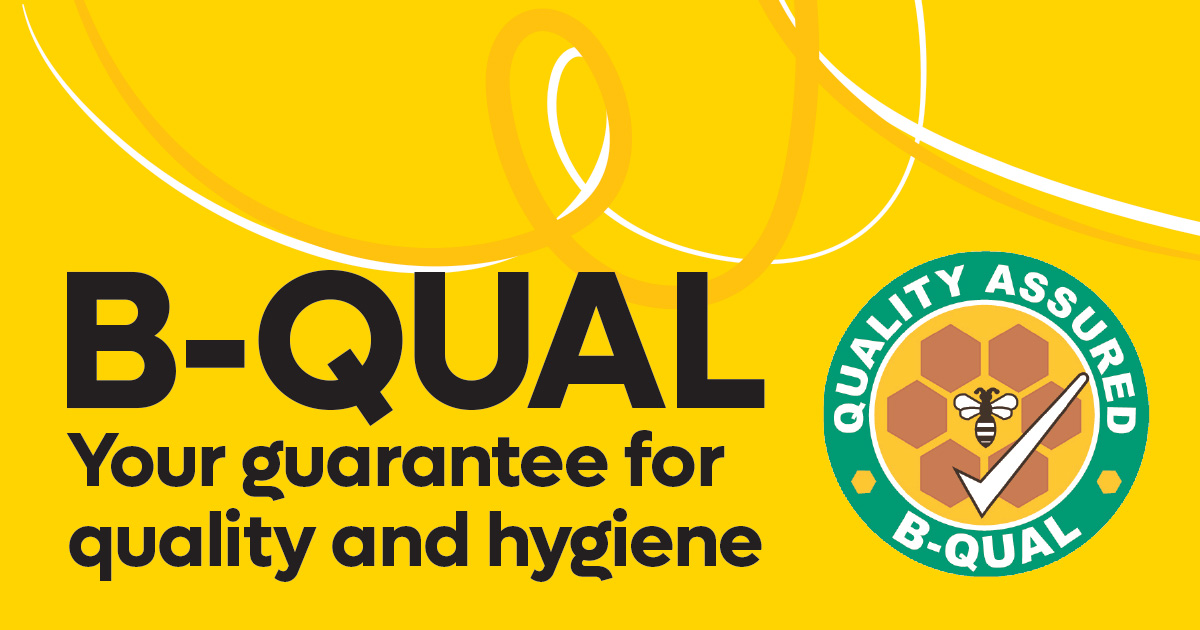
B-QUAL is an Industry Owned Quality Assurance System for Australian beekeepers.
How does B-QUAL certification benefit my business?
B-QUAL Certification also enables an enterprise to market its product under the B-QUAL logo to show that it meets the B-QUAL Industry Standards.
Complete your training at home at your own pace.
For more information and to obtain a Certification Information Pack, contact the B-QUAL Certification team.
www.bqual.com.au
B-QUAL Pty Ltd
Phone 07 49949820
Email: admin@bqual.com.au
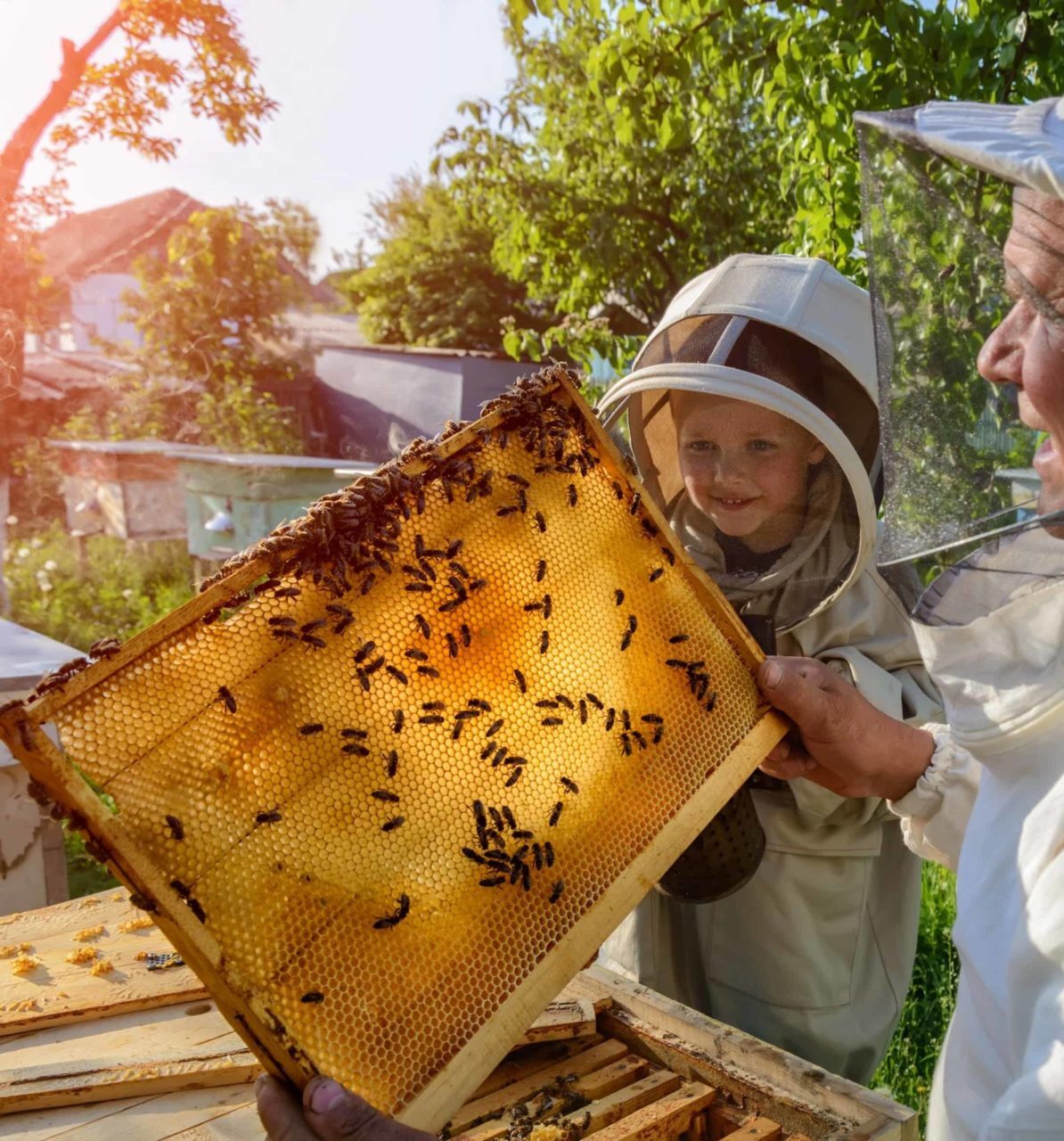
The specially designed app will assist in maintaining hive record information that satisfies the requirements of the National Biosecurity Code of Practice. The program is intended for small commercial and recreational beekeepers who sell honeybee products direct to:
The low annual fee includes the use of the hive management app and an annual desk audit.
For further information go to www.btrace.com.au

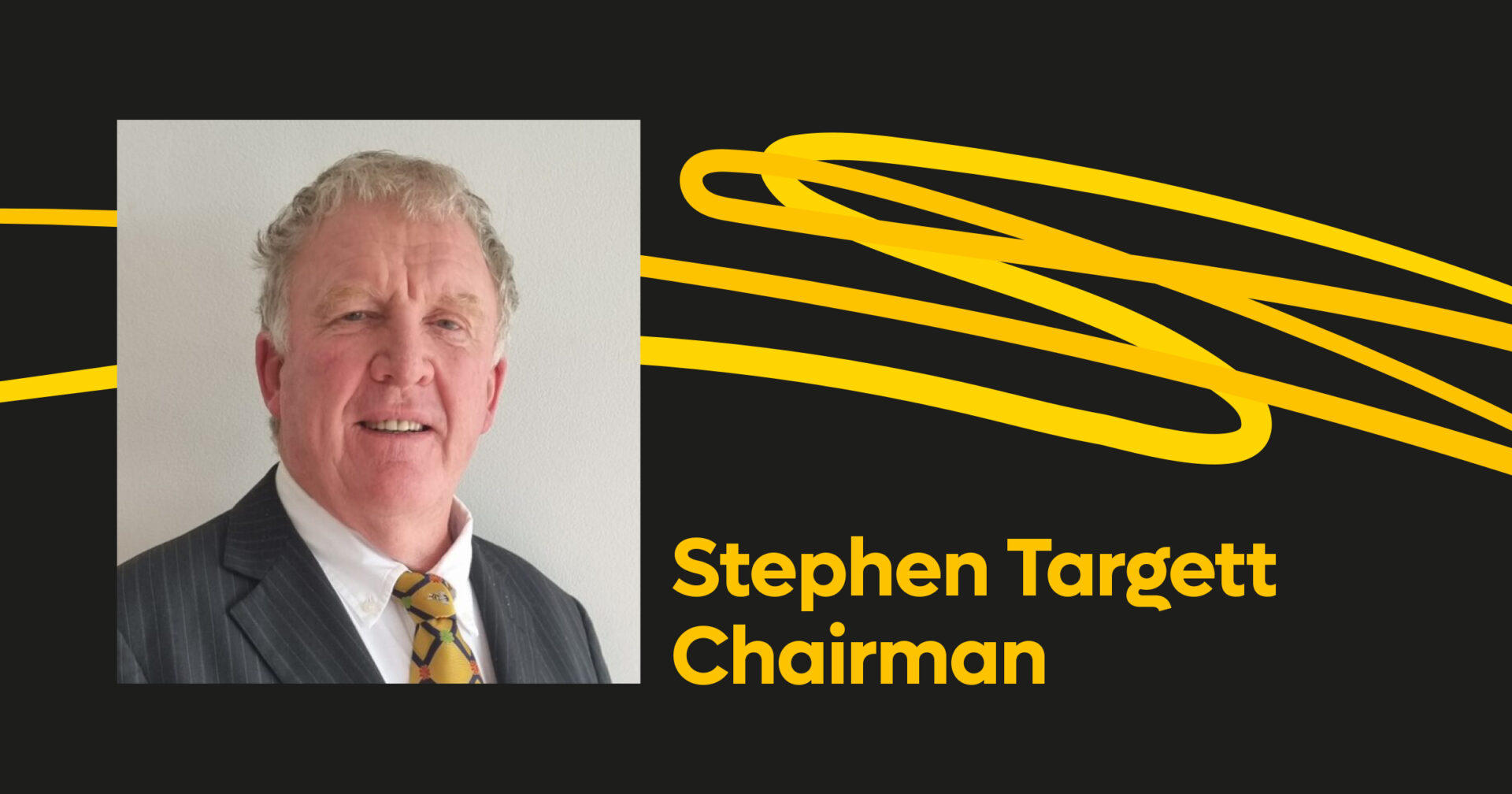
AHBIC recently held our AGM on the 8th July at Bendigo Victoria. Congratulations to Jon Lockwood on being elected Vice Chair of AHBIC. Congratulations also to Therese Kershaw, Stephen Fewster and Lindsay Callaway on being re-elected onto the executive. I look forward to working with Jon and the executive as we progress a review of AHBIC and our strategic plan.
There were approximately 10 motions for AHBIC out of the AGM. We will be actioning these motions as soon as practical. Our highest priorities are the varroa response and the WA A. florea incursion.
An initial Consultative Committee Emergency Plant Pest (CCEPP) meeting was recently held for the Red Dwarf Honeybee (RDH) and the Euvarroa mite that has been detected in northwestern WA. The WA government is the lead agency for this incursion and will investigate to delimit the incursion and will report back to the CCEPP in due course. We know that the RDH will be devastating for the environment and beekeeping in tropical areas of Australia should it not be eradicated.
There is very little peer reviewed literature on the Euvarroa mite except that it is a close relation of V. destructor and has similar biology. It has migrated from RDH to European honeybees in other parts of the world and is reported live for two years in its phoretic phase. Prof. Samuel Ramsay who presented at NSWAA conference is studying this mite and stated at the conference that this mite is a huge risk to Australian beekeeping. AHBIC will be lobbying strongly to have both these pests eradicated. This appears achievable as the incursion is on a peninsula and only a small amount of RDH has been detected. However, the CCEPP does not have enough information to make any decisions at this stage.
Back to NSW and the recent varroa mite detection at Gumble NSW in the blue zone which has triggered a review of the current varroa eradication plan. A CCEPP meeting was held recently with no decision confirmed and a request for more information from the lead agency. NSW DPI will therefore be reporting back to the CCEPP after their investigations are completed on the IP at the end of the month.
Many questions are being asked as to the process to change the direction of the response. Ultimately the decision lies with the National Management Group (NMG) who take recommendations from the Consultative Committee for Emergency Plant Pests (CCEPP).
The latest detections trigger a review of the response plan by the CCEPP. At that review affected parties will likely be asked to decide if the ‘new information presented changes the technical feasibility of the response plan’. Any decision must be reached by consensus and if no consensus decision can be reached then affected parties must negotiate to reach a resolution. Negotiations could include changes to the response plan or the dissenting affected party leaving the response if in the minority.
AHBIC has one equal vote of the 26 votes at the CCEPP table and one equal vote of the 26 votes at the NMG table. These are biosecurity incidents and once the CCEPP has been raised for that biosecurity incursion due process is followed as outlined in the agreed deed. A lot of what happens in the CCEPP and NMG is confidential and cannot be shared. This is frustrating to AHBIC and other affected parties at times and understandably to industry members.
AHBIC is aware of beekeeper concerns over business viability and continuity with the increasing footprint of varroa. Communications will be able to be released shortly on our industries share of the cost of the varroa incursion. The total cost to our industry for the full 3-year response under the current agreed response plan version 3 is under $1.5 million. To put that into perspective:
NSW has over 300,000 hives – just one varroa treatment for every hive will cost $2.4 million collectively in NSW, just to purchase the miticide strips. Not including labour, travel and likely numerous treatments required. NZ treat for varroa twice a year.
There are challenges ahead for our industry. I am confident that with our knowledgeable CEO and passionate executive, industry can rise to these challenges and industry will be placed as best we can be on the other side of those challenges.
Stephen Targett
Chair

The crazy conference season has now drawn to a close with the last of the member body conferences being in WA. There has been learnings and enlightening discussions from across the conferences. There have also been polarising views around the varroa response with everyone keen to offer their opinion which has been great to gauge the feeling in industry.
There are currently two positions available on the panel for a honey producer and pollination service provider. This panel is incredibly important for our industry as it is this panel that guides the research and development investments on behalf of our industry.
It is important that as an industry we have good representation on this panel. I encourage anyone who might be interested to apply. To apply follow the link Advisory Panel Application. Applications close 27th July.
In between state conferences I managed to attend the Australian Farm Institute conference on ESG (Environmental, Sustainability and Governance). These are goals and standards associated with achieving net zero by 2050. These are global standards that are being rolled out across the world and impacting every industry and will affect the honey bee industry too. I attended to help AHBIC understand what these impacts will be for our industry.
The biggest take away message for me was that global markets are setting benchmarks for ESG’s and if we as an industry don’t measure our emissions and footprint then we will be locked out of their markets. The EU is the first market that will demand ESG credentials with the rest to follow.
This is coming whether we like it or not, and as an industry we need to start thinking about and understanding our footprint and measuring it. AHBIC has been working with AgriFutures to understand how we can better prepare our industry for the new requirements.
We have launched the fighting fund with support starting to roll in. We are now looking for imported honey samples from shelves across the country. Honey can be sent to AHBIC with place and date of purchase accompanying the honey. AHBIC will use the fighting funds to test the honey for authenticity and use the results to lobby government for better testing protocols and testing rates at the border.
It has been exciting to follow the progress of the young beekeepers that are representing Australia in the international young beekeeper’s competition. The AHBIC executive provided cash support to the group to assist with travel costs. This demonstrates the importance the AHBIC executive places on the development of our future beekeepers. You can view the outcomes of their trip in our newsletter article here.
AHBIC has been successful in gaining a grant through AgriFutures to facilitate an immersion tour for our Bee Biosecurity Officers (BBO’s) from around the country to spend a week in New Zealand. This trip, scheduled for September, will up-skill our front-line officers in all things Varroa. Upon return the BBO’s will have a greater understanding of the challenges in managing Varroa and will disseminate these learnings to industry. This immersion tour is just one of the many activities AHBIC is doing to plan for the worst-case scenario should it occur.
We have been successful in gaining membership to the international working group for bee products. This working group is designing international standards for honey production, beeswax, royal jelly and propolis production. A mirror group has been established for Australia which will inform the decisions at the international working group and help develop Australian specific standards. The mirror group had the first kick-off meeting to begin the process a few weeks ago.
I am looking forward to having some more time at home over the next month and affording the time to progress the many issues before us.
In early August AgVic and Plant Health Australia are running a plant biosecurity response simulation ‘operation aggregate’. Many of the plant industries including AHBIC have been invited to attend the 2-day event.
Twice weekly Varroa response briefings are still occurring with many additional meetings with the response teams to work through issues.
I wish all the beekeepers travelling to almonds the best of luck and hope for kinder weather conditions for pollination than last year.

The Australian Government is working with state and territory governments to give farmers (including Beekeepers) the tools to manage the complex farm business risks faced by your enterprise.
Through this program farmers including farm managers and employees will have access to subsidised learning and development opportunities in strategic business management, farm risk management and decision-making, natural resource management, and personal and social resilience.
This program will provide practical help to farmers to:
The Program will also offer farmers:
Each state and territory run these programs to reach farm business right across Australia – delivered through each state and territory. You can find out what’s happening in each state or territory as information becomes available by selecting below:
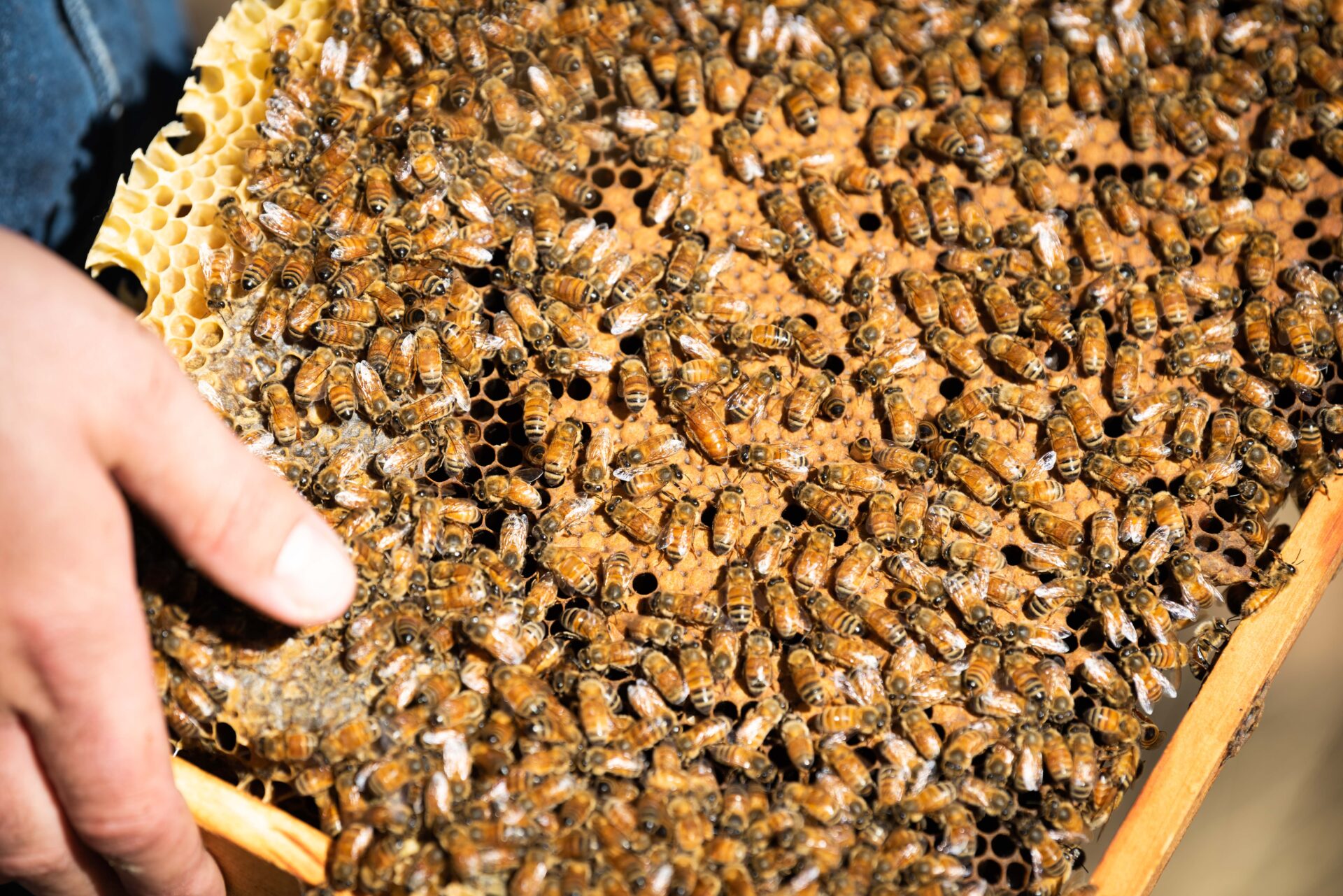
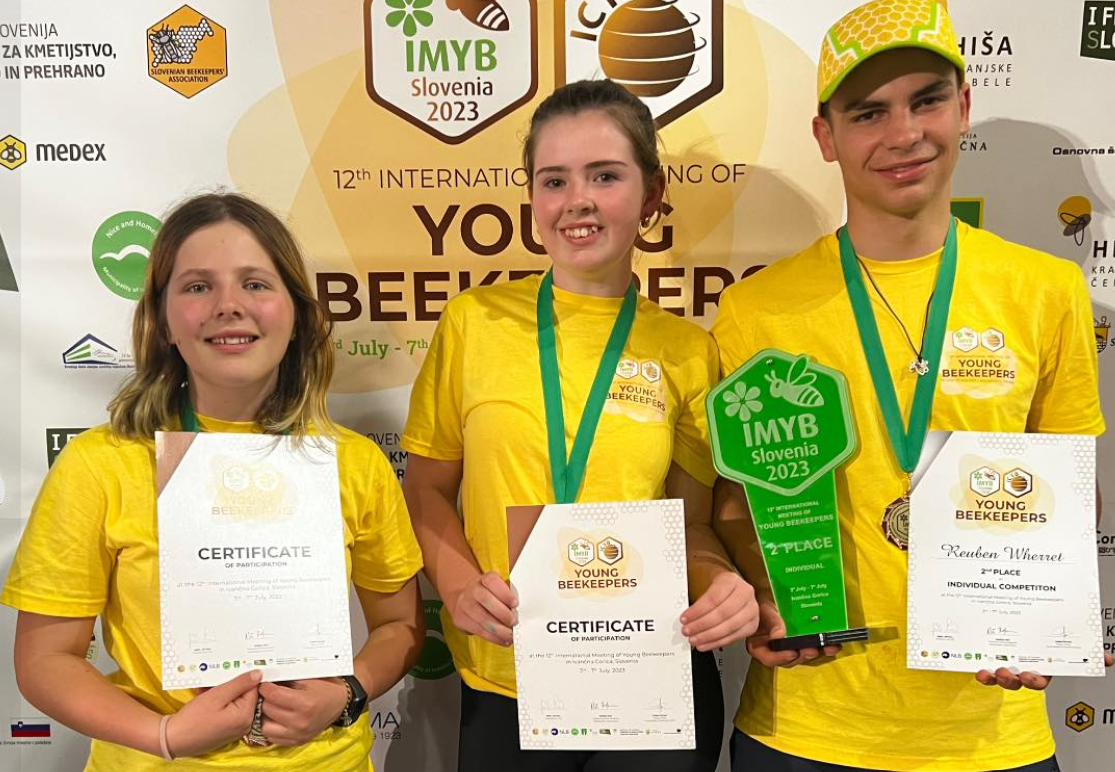 International Meeting of Young Beekeepers
International Meeting of Young BeekeepersThe competition of IMYB itself has several parts – usually it is divided into the following disciplines:
The team performed well and did Australia proud coming an unbelievable 5th place in the Country Competition, with Ruben Wherrett taking out 2nd Place in the Individual Competition, collectively they have shown that Australia is both a team that have a great attitude and an ability to succeed on the world stage.
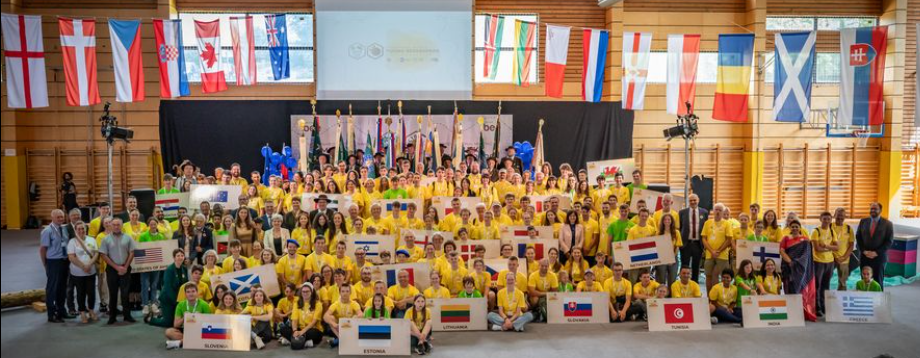
Visit AHBIC’s Imported Honey Fighting Fund Page to Donate Now!
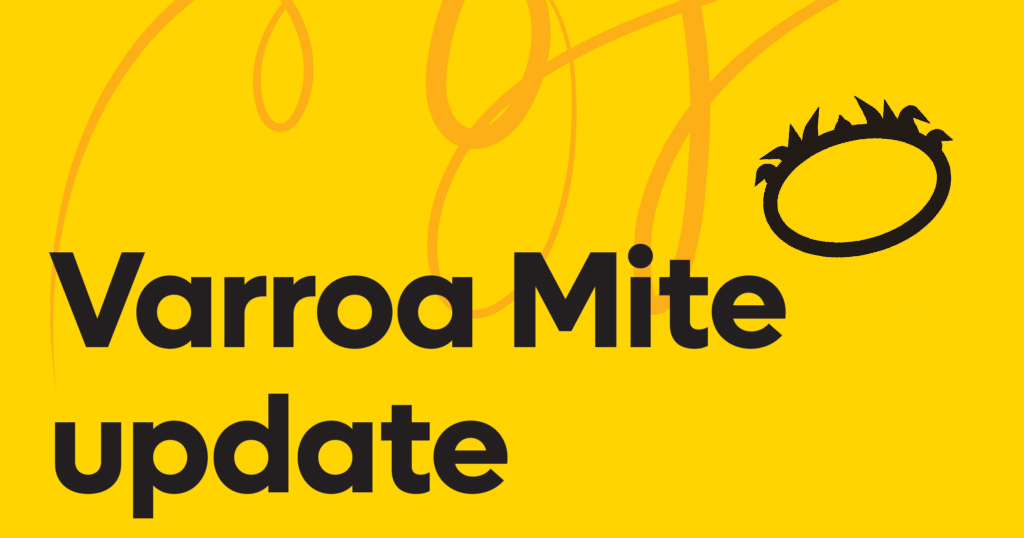
The Consultative Committee for Emergency Plant Pest (CCEPP) met on Friday 14th July to discuss the most recent detection near Gumble as this detection triggers the response for a review by the CCEPP. In addition, other response plan triggers including total red zone area, Sydney basin detection and additional Emergency Plant Pest detection in WA affecting honey bees (A. florea) also triggered a review by the CCEPP.
The affected parties received a verbal update from NSW DPI with the details and circumstances around the Gumble detection. The conversation had a strong focus on risk, tracing efforts and the immediate impacts this could have on borders and hive movements.
Questions were raised about the low mite count and proposed timeframe of hive movements and further questions around the Sydney basin detections.
All CCEPP parties agreed that more information from NSW DPI is needed to make an informed decision, however, based on the information presented both Victoria and Queensland committed to maintaining the current border movement rules.
Another CCEPP meeting is scheduled for the end of July when DPI will present more detailed and complete information around the detection, area and other implications for the response and budget.
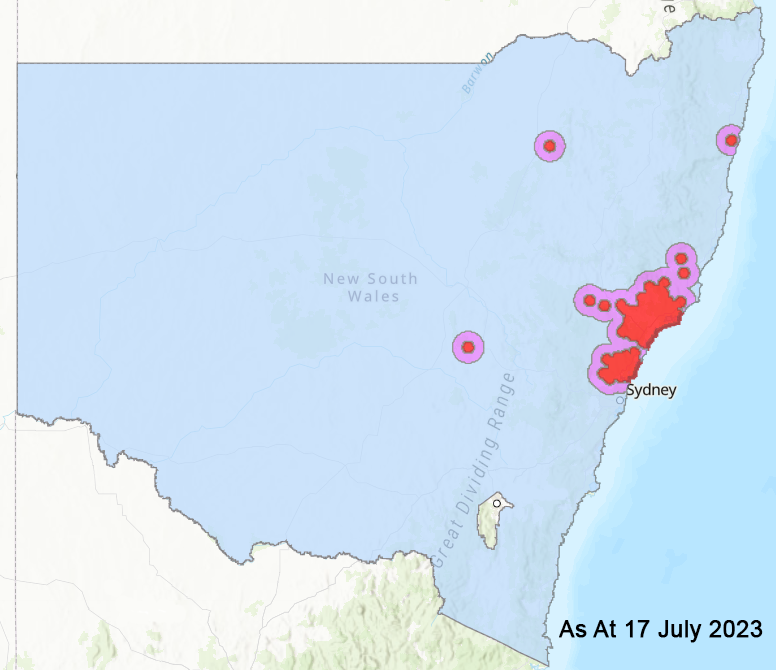
Varroa Coordinator
Bianca Giggins bianca@honeybee.org.au
0402 467 780
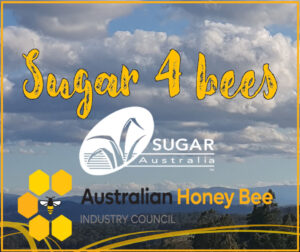
AHBIC in partnership with Sugar Australia have launched the Sugar 4 bees program to assist beekeepers affected by the Emergency Response.
The first collection of Sugar 4 Bees took place in May, a second was completed in early August, we supplied sugar dust to several beekeepers with the help of the NSW DPI at Somersby.
Mid August with the generous assistance of Ecrotek in Blayney,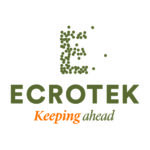 additional dust was supplied to beekeepers in the Gumble Purple zone. There are still numerous bags available for Gumble Beekeepers, please complete the form below to secure your collection, we will be in touch to finalise with you.
additional dust was supplied to beekeepers in the Gumble Purple zone. There are still numerous bags available for Gumble Beekeepers, please complete the form below to secure your collection, we will be in touch to finalise with you.
Bianca Giggins is coordinating so if you are interested in registering for a collection, please complete the form below.
The sugar dust will be in 1 tonne bulka bags. If beekeepers cannot safely accept 1 tonne bags, arrangements will need to be made for smaller sized collection.
The dust is available to assist beekeepers maintain hive health whilst impacted by the current Varroa incursion. The sugar dust attracts moisture and will go solid if not used quickly.
CLICK HERE to secure a collection.
The National Bee Pest Surveillance Program (NBPSP) is a risk-based program undertaking surveillance at ports that have been evaluated as the highest risk of entry and establishment of European or Asian honey bees and the exotic bee mites they carry.
This risk-based approach is designed to provide early detection through activities occurring at high-risk locations and at a frequency that will detect new pests. This provides the best chance of eradication or containment of pests before they have a chance to spread widely in bee populations and impact pollination services.
The NBPSP involves a range of equipment, tools, activities, and diagnostic techniques to target and provide early detection of the nine high priority exotic bee pests, including Varroa mite, Tropilaelaps mite and Tracheal mite.
The National Bee Pest Surveillance Program (NBPSP) is funded by Hort Innovation using research and development levies of 14 horticultural industries, with significant contributions from states and territories and co-investment from Australian honey bee industry Levies, Grain Producers Australia and the Australian Government.
The NBPSP is coordinated by Plant Health Australia and delivered by all state and the Northern Territory governments.
In 2022 the NBPSP performed surveillance activities at 22 locations throughout Australia. A total of 3,287 surveillance activities targeting exotic bee pests and exotic pest bees were conducted.
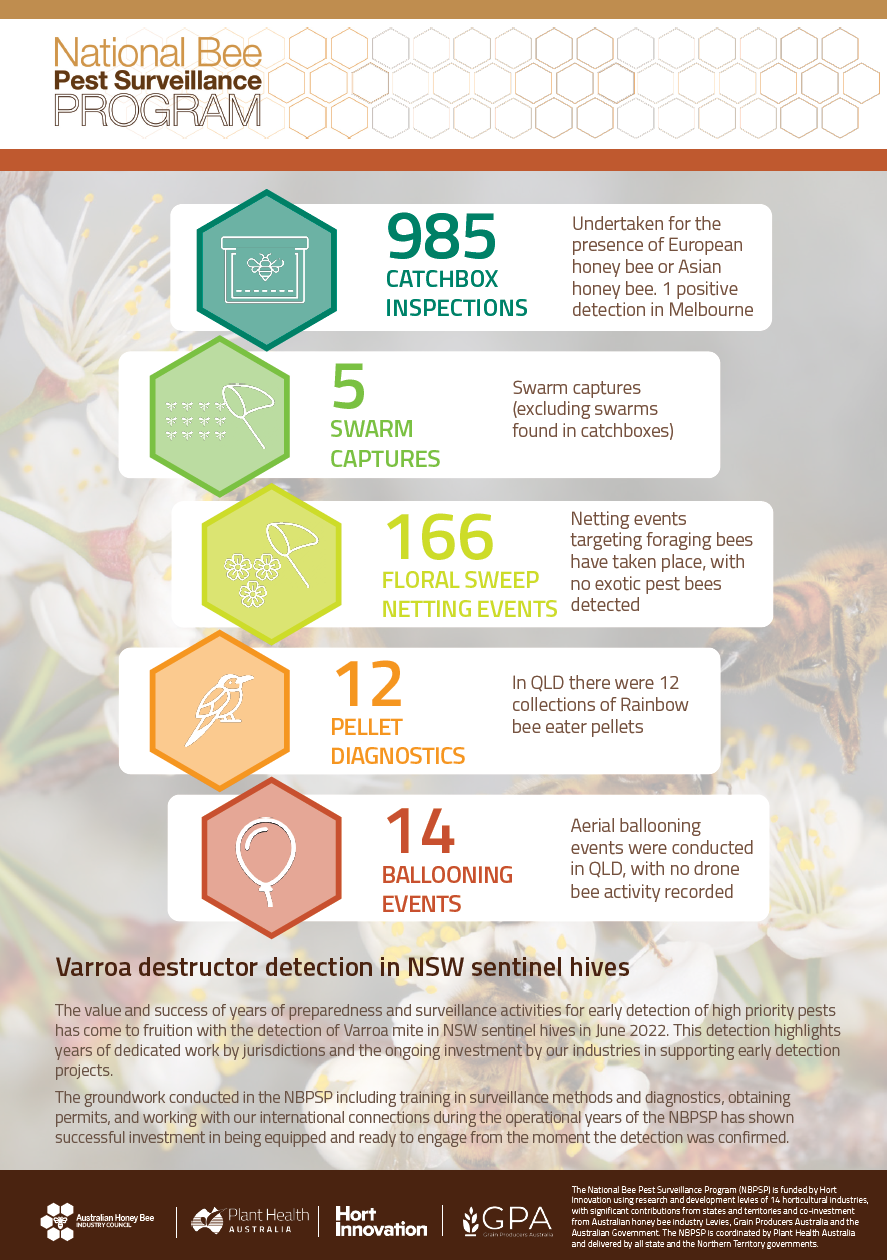
It was a trans-Tasman tussle fought over many years but Tasmanian beekeepers have emerged triumphant over manuka honey naming rights.
An eight year trans Tasman legal battle has ended with New Zealand losing its “audacious” bid to exclusive global use of the term manuka Tasmanian Beekeepers Association president Lindsay Bourke hailed the Intellectual Property Office of New Zealand ’s decision saying the drawn out case had driven down prices after New Zealand labelled the Tasmanian and Australian honey a fake. “The result is as it should be,” he said.
“It was a ridiculous and selfish act. “Beekeepers around the world have historically been a fraternity, but who needs enemies when you have ‘friends’ like our NZ counterparts. “New Zealand had an ugly head and they kept raising it up. “We have consistently extended an olive branch, seeking collaboration for the mutual benefit of both nations, in the spirit of ANZAC. “However, our offers were consistently and completely rejected by New Zealand, adopting a ‘winner take all’ approach.”
In a 171 page decision NZ Assistant Commissioner of Trade Marks Natasha Alley said it was one of the “most complex and long running proceedings ” to come before the Intellectual Property Office. “This case represents a trans Tasman tussle of extraordinary proportions over trade mark rights for mānuka honey,” she said.
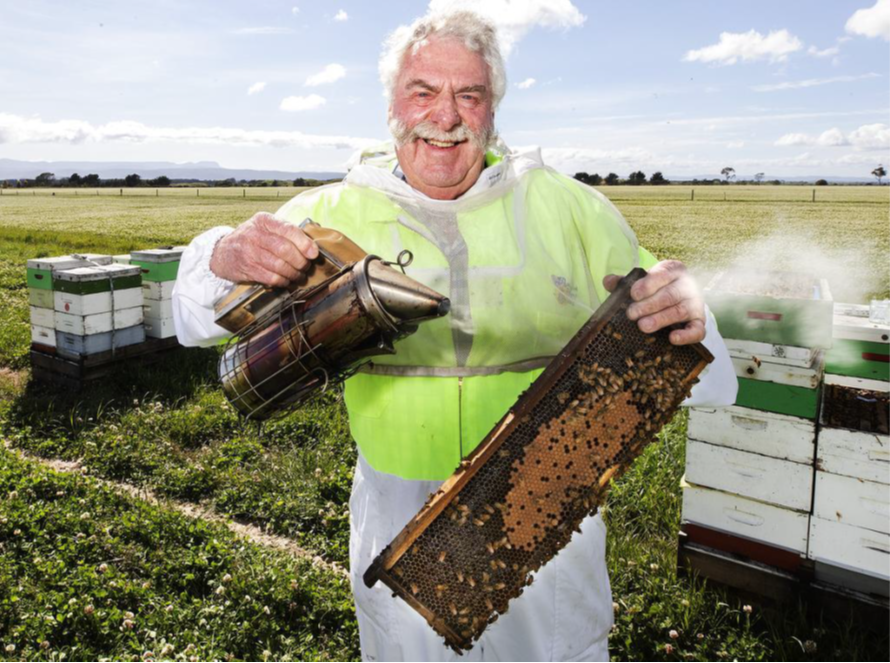
“The opposition proceeding involves extensive factual and legal issues, some of which are novel, along with voluminous evidence and submissions.” Mr Bourke said the application for exclusive use by New Zealand was refused on several grounds, including that manuka honey was descriptive of
the goods of the application and was therefore not registrable under the Trade Marks Act 2002. He said manuka has been in the Australian language for over 150 years, starting in Tasmania and Australia’s First Nations people had been consuming manuka honey for over 60,000 years, obtaining it from the hives of stingless bees.
“The inconvenient reality for NZ is that the honey with the highest MGO (Methylglyoxal) content is from leptospermum polygalifolium found predominantly on the East Coast of Australia,” Mr Bourke said. “Leptospermum scoparium is the predominant native species in Tasmania and the only species regarded as being a native to NZ. “The Australian manuka honey industry has faced relentless attacks from the powerful New Zealand manuka companies, many controlled by overseas interests.”
Article shared from The Mercury – Tasmania by Sue Bailey
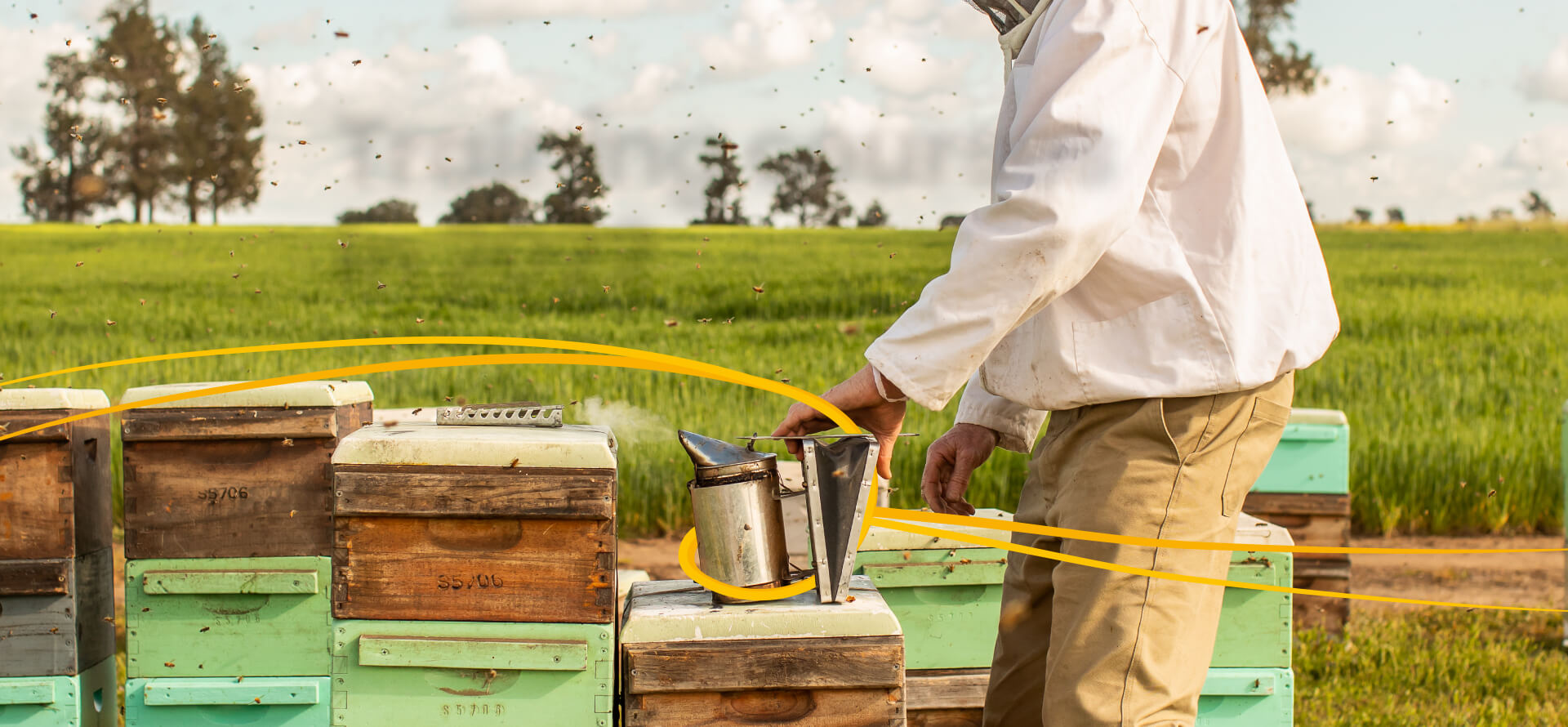
The AgriFutures Honey Bee & Pollination Program has two positions available to join the Honey Bee & Pollination Program Advisory Panel.
These exciting positions are open for industry members who are either commercial honey producers or commercial pollination service providers. Significant governance and financial management skills will be considered highly but are not considered essential.
Advisory Panel members may be required for up to 25 days per year and some travel is necessary. Please consider the time requirements of this commitment prior to applying.
To maintain continuity of the Advisory Panel, knowledge and to ensure diversity in skillsets, the appointment of successful Advisory Panel applicants will be staggered prior to January 2024. Successful applicants will also be invited to observe Advisory Panel meetings prior to their official commencement date.
This is a fantastic opportunity for the next generation of honey industry leaders to become involved in the allocation of RD&E funding.
For more information regarding the desired skill set for the Honey Bee & Pollination Panel positions, please refer to the Honey Bee & Pollination Program Advisory Panel Selection Criteria.
Applicants are required to complete the application form, skills matrix and attach their CV (no longer than three pages) via the online application system.
As part of the application process applicants will be required to outline relevant experience in the Honey Bee & Pollination industry and expected contribution to the Advisory Panel.
Apply for the AgriFutures Honey Bee & Pollination Advisory Panel
Submissions close Thursday, 27 July 2023 at 12pm.
For any questions regarding the AgriFutures Honey Bee & Pollination Advisory Panel recruitment please contact:
Annelies McGaw
Program Manager
0407 987 738
Annelies.McGaw@agrifutures.com.au
